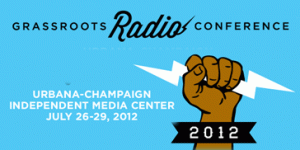Jennifer and I attended the Grassroots Radio Conference this past weekend in Urbana, IL. These are my old stomping grounds, having lived in the twin college towns of Champaign-Urbana for about 13 years until 2008. Home to the University of Illinois the cities are also home to a disproportionate of grassroots action and interesting radio.
Due to my work schedule and desire to catch up with some friends I didn’t attend nearly as many sessions as Jennifer did. However, I was very impressed overall with the running of the conference and the sessions on offer.
This was my second GRC, with the first one being back in 2000, hosted in Madison, WI by community radio WORT-FM. Coming on the heels of the so-called “Battle in Seattle” and the successful protests against the 1999 World Trade Organization meeting, much of that GRC was dedicated to the new Independent Media Center movement and a revitalized interest in grassroots reporting.
By comparison, much of the 2012 GRC was dedicated to the nuts and bolts of getting new community radio stations on the air. This, of course, resulted from the passage of the Local Community Radio Act and the imminent licensing window that promises to open the gates for hundreds of new, low-power community stations.
Staff and volunteers from the Prometheus Radio Project were in attendance to help facilitate sessions and provide comprehensive advice to folks looking to start a station. At the same time, plenty of sessions were also dedicated to the basics of running and keeping an existing station on the air. There were also quite a few sessions and presentations dedicated to strengthening the voices of people of color in grassroots radio.
I agreed to moderate a session about the future survival of college radio. On the panel were my Radio Survivor colleague Jennifer Waits, Ted Coe from thriving college station KCSB-FM, Sharon Scott from Save WRVU and college radio veteran Norm Prusslin, emeritus president of the Intercollegiate Broadcast System and student media advisor at Stony Brook University.
We started the panel by reviewing some of the threats to college radio as exemplified by the take-over and selling of stations like University of San Francisco’s KUSF and Vanderbilt University’s WRVU. Sharon was able to shed light on some warning signs that in hindsight she wished were more obvious, such as the disengagement of student volunteers. Ted discussed how KCSB has been able to highlight its history and service to the Santa Barbara community in order to help solidify its foundation of university and community support.
Jennifer drew upon her extensive research and reporting to share how college and community radio stations have come together in the wake of these station sales to network and share resources, noting that isolation can be a bad thing for college stations. Norm called upon his decades of experience to reflect on how some stations have come back from the brink and how stations can go stronger by responding affirmatively to internal and external threats.
One of the overarching themes that came from the panel is that college radio stations cannot afford to lay low and try not to be noticed. Although that may have been decent advice fifteen years ago, when stations often avoided ruffling feathers on campus in order to protect their meagre funding, these days an unknown station is a vulnerable station. Instead college stations are well advised to work to maintain and strengthen student involvement, while also understanding the priorities of their institution’s administration. Demonstrating value to both the on-campus community in addition to the surrounding community is also important.
An interesting session I attended reviewed legal issues facing all stations, presented by communications lawyer Michael Couzens, who recently has been assisting Viva WRVU, and facilitated by [Prometheus Policy Director Brandy Doyle](http://www.prometheusradio.org/staff_and_board). The session started with a discussion of the third-party fundraising proceeding in front of the FCC. Participants seemed generally against the idea, raising concerns about stations having to confront a litany of requests for fundraising airtime and the proposal being a wedge to force more commercialized messages on noncommercial stations. Couzens then reviewed important aspects of underwriting, indecency and other broadcast rules that can land big fines for stations that aren’t careful.
A big thanks go to the volunteers of the Urbana-Champaign Independent Media Center for hosting and running the conference, in addition to all the folks who came to present and participate. 16 years into its existence I’m glad to see the GRC still going strong, providing crucial support and networking for noncommercial stations that work to provide a platform for voices otherwise barely heard even on public radio.



